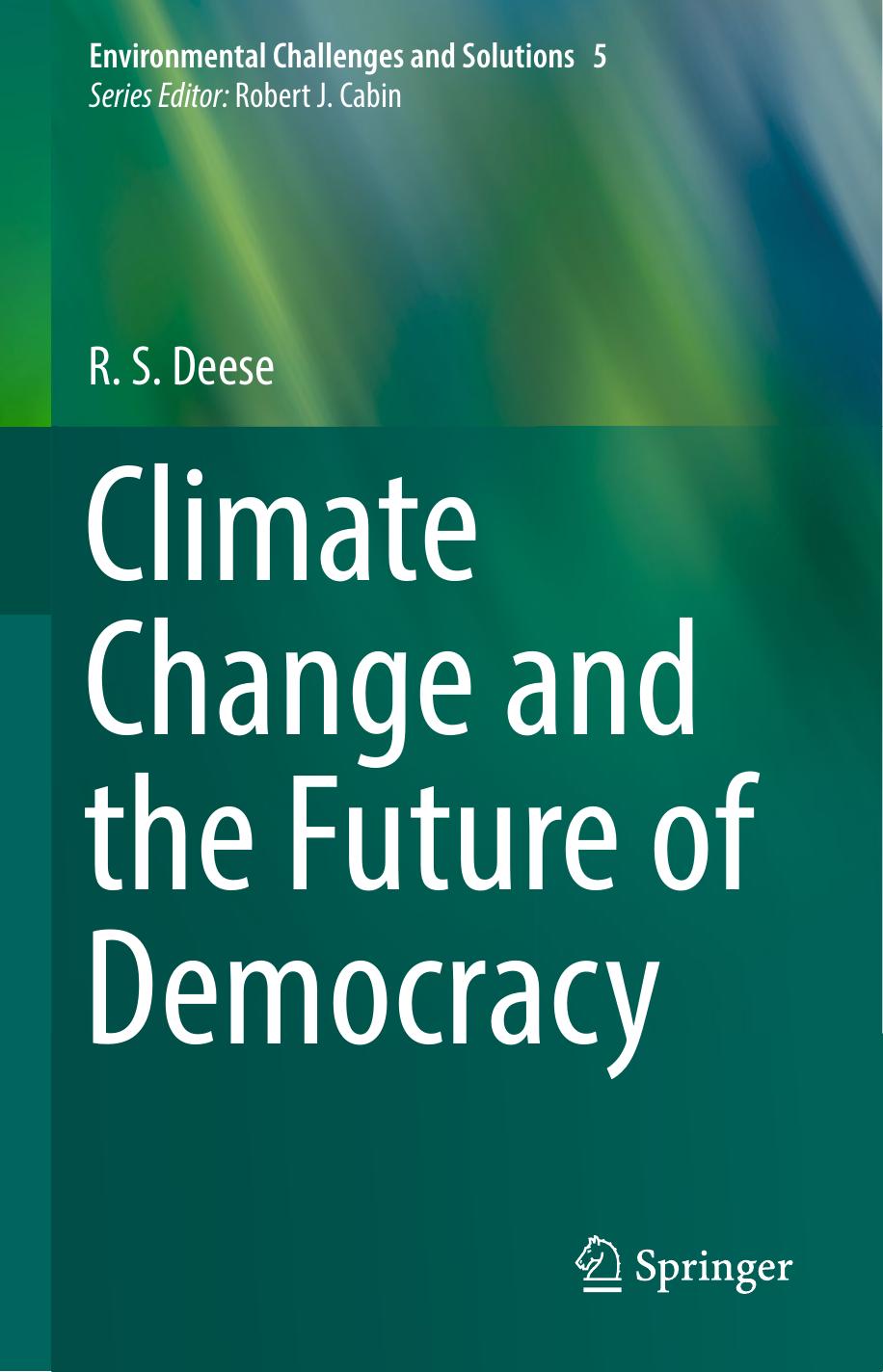Climate Change and the Future of Democracy by R. S. Deese

Author:R. S. Deese
Language: eng
Format: epub, pdf
ISBN: 9783319983073
Publisher: Springer International Publishing
In other words, if we want democracy to survive in an age of globalization, we must create new democratic institutions so that global affairs will be conducted “not by diplomats representing the executive, but by representatives of the people in international bodies of deliberation” (Borgese 1965, p. 20).
Elisabeth Mann Borgese was perhaps especially suited to examine the power of democratic ideals in the face of global crises. Born in 1918 to the German writer Thomas Mann and his wife Katia Pringsheim Mann, she came of age on a continent shadowed both by total war and by the rise of totalitarian government, before her family moved to the United States in 1938. Committed to the prevention of war through the expansion of democratic freedom and accountability across national boundaries, she became involved in the Committee to Draft a World Constitution at the University of Chicago immediately after World War Two. Although the world federalist movement was greatly weakened by the Cold War polarization of the 1950s, Elisabeth Mann Borgese would not abandon her vision of building a framework for intelligent cooperation and democratic accountability on a global scale. In the late 1960s, she worked with former University of Chicago President Robert Maynard Hutchins at the Center for the Study of Democratic Institutions in Santa Barbara to advance the cause of ocean conservation. In 1970, she helped conceive of and convene the first Pacem in Maribus (Peace in the Oceans) Conference in Malta. This conference spurred the creation of the International Ocean Institute, an NGO dedicated to ocean conservation founded in 1972. In the realm of international law, the Pacem in Maribus Conference accelerated the painstaking process of advancing negotiations for UNCLOS, which was opened for signature in 1982. Her chief contribution to this treaty was to affirm the principle, first articulated by the Committee to Frame a World Constitution at the University of Chicago in the late 1940s, that any universal commons, such as the seabed under international waters, must be protected as the common heritage of the entire human race.
As the youngest daughter of Thomas Mann and Katia Pringsheim Mann, Elisabeth grew up in an atmosphere where political cosmopolitanism was part of her intellectual inheritance. Her father was an outspoken opponent of ultra-nationalism in Germany for years before the rise of Hitler, and her mother was the granddaughter of one of the most outspoken European feminist authors of the nineteenth century, Hedwig Dohm. One of Dohm’s most famous statements (“Die Menschenrecht habt keine Geschlecht” or “Human rights have no gender”) appears as the epitaph on her gravestone, and was a credo that Elisabeth exemplified with her life’s work.
Although Elisabeth’s father was perhaps the most famous German author of the twentieth century, Thomas Mann was a better exemplar of Enlightenment cosmopolitanism than he was of any particular national culture. The novel for which he won the Nobel Prize, Buddenbrooks, presents itself as the chronicle of a merchant family in decline, but it can also be read as a lamentation for the
Download
Climate Change and the Future of Democracy by R. S. Deese.pdf
This site does not store any files on its server. We only index and link to content provided by other sites. Please contact the content providers to delete copyright contents if any and email us, we'll remove relevant links or contents immediately.
The Secret History by Donna Tartt(19085)
The Social Justice Warrior Handbook by Lisa De Pasquale(12190)
Thirteen Reasons Why by Jay Asher(8909)
This Is How You Lose Her by Junot Diaz(6885)
Weapons of Math Destruction by Cathy O'Neil(6279)
Zero to One by Peter Thiel(5801)
Beartown by Fredrik Backman(5751)
The Myth of the Strong Leader by Archie Brown(5507)
The Fire Next Time by James Baldwin(5442)
How Democracies Die by Steven Levitsky & Daniel Ziblatt(5218)
Promise Me, Dad by Joe Biden(5153)
Stone's Rules by Roger Stone(5087)
A Higher Loyalty: Truth, Lies, and Leadership by James Comey(4960)
100 Deadly Skills by Clint Emerson(4924)
Rise and Kill First by Ronen Bergman(4788)
Secrecy World by Jake Bernstein(4752)
The David Icke Guide to the Global Conspiracy (and how to end it) by David Icke(4717)
The Farm by Tom Rob Smith(4507)
The Doomsday Machine by Daniel Ellsberg(4490)
